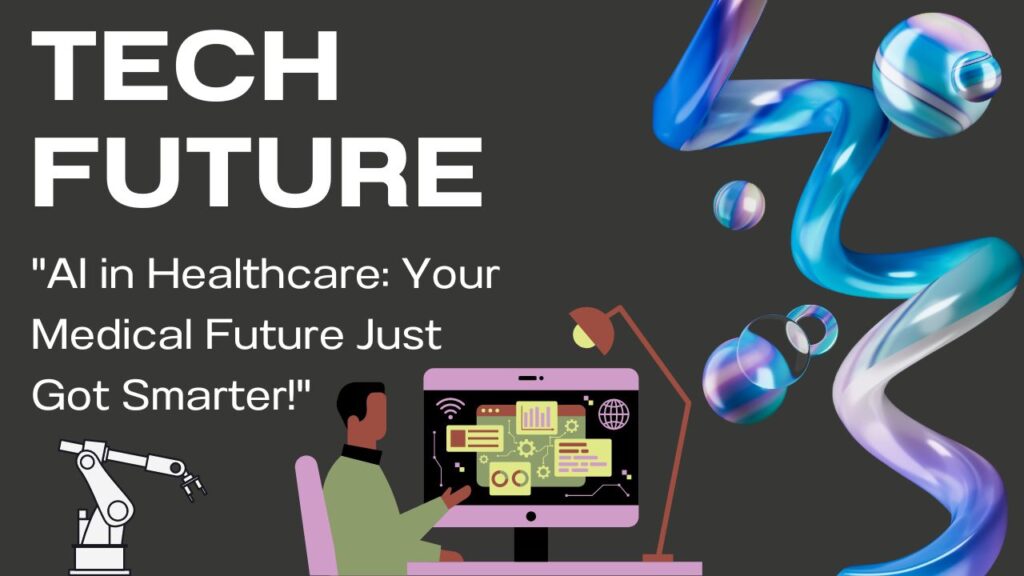
In the rapidly evolving landscape of healthcare, Artificial Intelligence (AI) stands as a beacon of innovation, reshaping the way we approach diagnostics, treatment planning, and patient care. With the advent of AI-powered medical imaging, predictive analytics, and genomics, the realm of healthcare is undergoing a profound transformation. Moreover, virtual health assistants and remote monitoring systems are empowering patients, improving access to care, and promoting proactive health management. In this comprehensive exploration, we delve into the myriad applications and revolutionary impact of AI in healthcare, uncovering the potential to deliver personalized, data-driven solutions that enhance patient outcomes and revolutionize the delivery of healthcare services.
Introduction: The Promise of AI in Healthcare
The convergence of AI and healthcare holds immense promise, offering unprecedented opportunities to improve patient outcomes, enhance operational efficiency, and revolutionize medical practices. From enhancing diagnostic accuracy to enabling personalized treatment plans, AI-driven technologies are driving a paradigm shift in how we approach healthcare delivery. This article explores the multifaceted applications of AI in healthcare and examines how these technologies are reshaping the future of medicine.
AI-Powered Medical Imaging: Revolutionizing Diagnostics
One of the most transformative applications of AI in healthcare is in the field of medical imaging. AI algorithms trained on vast datasets of medical images have demonstrated remarkable accuracy in detecting abnormalities, identifying patterns, and assisting radiologists in making diagnostic decisions. From detecting early signs of cancer to assessing the severity of neurological conditions, AI-powered medical imaging holds the potential to revolutionize diagnostic practices, enabling earlier detection and more effective treatment interventions.
Advancements in AI Medical Imaging
Recent advancements in AI medical imaging have propelled the field forward, enabling more precise and efficient diagnosis across a wide range of medical conditions. Deep learning algorithms, in particular, have shown promise in enhancing image interpretation accuracy and reducing diagnostic errors. By leveraging convolutional neural networks (CNNs) and other deep learning architectures, AI systems can analyze medical images with unprecedented speed and accuracy, enabling clinicians to make more informed decisions and improve patient outcomes.
Applications of AI Medical Imaging
AI medical imaging technologies have found applications in various medical specialties, including radiology, cardiology, oncology, and neurology. In radiology, AI algorithms assist radiologists in detecting abnormalities such as tumors, fractures, and hemorrhages, improving diagnostic accuracy and reducing interpretation time. In cardiology, AI-powered imaging techniques enable early detection of cardiovascular diseases and assist in planning interventions such as cardiac catheterization and stent placement. Similarly, in oncology, AI algorithms analyze medical images to identify cancerous lesions, assess tumor characteristics, and guide treatment planning decisions.
Predictive Analytics and Precision Medicine: Optimizing Treatment Strategies
AI-driven predictive analytics are revolutionizing the way healthcare providers approach treatment planning and patient care. By analyzing vast amounts of patient data, including electronic health records, genomic information, and real-time monitoring data, AI algorithms can identify patterns, predict disease progression, and tailor treatment strategies to individual patient profiles. This approach, known as precision medicine, holds the promise of delivering more targeted and effective therapies, optimizing patient outcomes, and reducing healthcare costs.
The Role of AI in Precision Medicine
Precision medicine aims to tailor medical treatment to the individual characteristics of each patient, taking into account factors such as genetic makeup, lifestyle, and environmental influences. AI plays a critical role in precision medicine by analyzing large-scale genomic and clinical data to identify biomarkers, predict treatment responses, and optimize therapeutic interventions. By leveraging machine learning algorithms, healthcare providers can develop personalized treatment plans that are tailored to the unique needs of each patient, improving treatment efficacy and minimizing adverse effects.
Applications of AI in Precision Medicine
AI-driven precision medicine technologies have applications across a wide range of medical specialties, including oncology, cardiology, neurology, and psychiatry. In oncology, AI algorithms analyze genomic data to identify genetic mutations associated with cancer development and progression, guiding treatment decisions such as targeted therapy and immunotherapy. In cardiology, AI-based risk prediction models help clinicians assess cardiovascular risk factors and develop personalized prevention strategies for patients at high risk of heart disease. Similarly, in neurology, AI-driven imaging techniques enable early detection of neurological disorders such as Alzheimer’s disease and Parkinson’s disease, facilitating early intervention and disease management.
Virtual Health Assistants and Remote Monitoring: Empowering Patients
Virtual health assistants and remote monitoring systems are empowering patients to take control of their health and well-being. These AI-driven technologies enable patients to access personalized health information, receive real-time guidance, and monitor their health status from the comfort of their homes. From medication reminders to dietary recommendations, virtual health assistants provide valuable support and guidance, improving patient adherence to treatment regimens and promoting proactive health management.
The Rise of Virtual Health Assistants
Virtual health assistants, also known as chatbots or virtual nurses, are AI-powered conversational interfaces that interact with patients to provide information, support, and guidance on a wide range of healthcare topics. These virtual assistants leverage natural language processing (NLP) and machine learning algorithms to understand patient queries, provide relevant information, and offer personalized recommendations. Virtual health assistants can assist patients with tasks such as scheduling appointments, refilling prescriptions, and accessing educational resources, improving patient engagement and satisfaction.
Remote Monitoring Systems for Chronic Disease Management
Remote monitoring systems enable healthcare providers to monitor patients’ health status and vital signs remotely, allowing for early detection of health problems and timely intervention. These systems typically involve wearable devices equipped with sensors that collect physiological data such as heart rate, blood pressure, and blood glucose levels. AI algorithms analyze the collected data in real-time, alerting healthcare providers to any abnormalities or changes in the patient’s condition. Remote monitoring systems are particularly beneficial for patients with chronic conditions such as diabetes, hypertension, and heart disease, enabling proactive management of their health and reducing the need for frequent hospital visits.
Ethical and Regulatory Considerations: Ensuring Patient Safety and Privacy
While the potential benefits of AI in healthcare are vast, there are also significant ethical and regulatory considerations that must be addressed. Ensuring patient safety, privacy, and data security is paramount in the development and deployment of AI-driven healthcare technologies. Regulatory frameworks and guidelines must be established to govern the ethical use of AI in healthcare and protect patient rights. Additionally, efforts must be made to mitigate bias in AI algorithms and ensure equitable access to AI-driven healthcare solutions for all patients.
Ethical Considerations in AI Healthcare
Ethical considerations in AI healthcare encompass a wide range of issues, including patient privacy, data security, algorithmic bias, and informed consent. Healthcare organizations must adhere to strict privacy regulations such as the Health Insurance Portability and Accountability Act (HIPAA) and the General Data Protection Regulation (GDPR) to protect patient health information from unauthorized access and misuse. Additionally, efforts must be made to mitigate algorithmic bias in AI healthcare systems, which can lead to disparities in healthcare delivery and outcomes among different patient populations. Ensuring transparency, accountability, and fairness in the development and deployment of AI-driven healthcare technologies is essential to build trust and confidence among patients and healthcare providers.
Regulatory Landscape for AI Healthcare
The regulatory landscape for AI healthcare is rapidly evolving, with governments and regulatory bodies around the world working to establish guidelines and standards for the ethical use of AI in healthcare. In the United States, the Food and Drug Administration (FDA) has issued guidelines for the regulation of AI-based medical devices, outlining requirements for safety, effectiveness, and quality control. Similarly, the European Union has introduced the Medical Device
Regulation (MDR), which includes provisions for the regulation of AI-based medical software. These regulations aim to ensure that AI-driven healthcare technologies meet stringent safety and performance standards and undergo rigorous testing and validation before being deployed in clinical settings.
Future Directions: Unlocking the Full Potential of AI in Healthcare
As AI continues to evolve and mature, the potential for its transformative impact on healthcare is virtually limitless. Future advancements in AI-driven technologies, such as explainable AI and federated learning, hold the promise of further enhancing diagnostic accuracy, treatment efficacy, and patient outcomes. Additionally, AI-powered healthcare systems may increasingly integrate with emerging technologies, such as wearable devices and telemedicine platforms, to deliver more seamless and personalized care experiences.
Advancements in AI Healthcare Technologies
Future advancements in AI healthcare technologies are expected to focus on enhancing the interpretability, transparency, and reliability of AI algorithms. Explainable AI techniques aim to make AI systems more transparent and interpretable by providing insights into the decision-making process of AI algorithms. This is particularly important in healthcare, where clinicians need to understand the rationale behind AI-driven diagnostic and treatment recommendations. Additionally, federated learning techniques enable AI models to be trained collaboratively across multiple institutions while preserving patient privacy, allowing for the development of more robust and generalizable AI healthcare models.
Integration of AI with Emerging Technologies
The integration of AI with emerging technologies such as wearable devices, telemedicine platforms, and Internet of Things (IoT) devices holds promise for transforming the delivery of healthcare services. Wearable devices equipped with biosensors and AI algorithms can continuously monitor patients’ health status and provide real-time feedback and guidance. Telemedicine platforms powered by AI enable remote consultations and diagnosis, expanding access to healthcare services to underserved populations. IoT devices connected to AI-driven healthcare systems enable seamless data exchange and interoperability, facilitating more efficient and personalized healthcare delivery.
Conclusion: Embracing the AI-Enabled Future of Healthcare
In conclusion, AI is poised to revolutionize the healthcare industry, driving innovation, improving patient outcomes, and transforming the delivery of healthcare services. From AI-powered medical imaging and predictive analytics to virtual health assistants and remote monitoring systems, the applications of AI in healthcare are vast and far-reaching. By harnessing the power of AI-driven technologies, we have the opportunity to deliver personalized, data-driven healthcare solutions that enhance patient care, promote preventive medicine, and usher in a new era of precision healthcare delivery. Embracing the AI-enabled future of healthcare holds the promise of transforming healthcare delivery and improving the lives of patients around the world.






